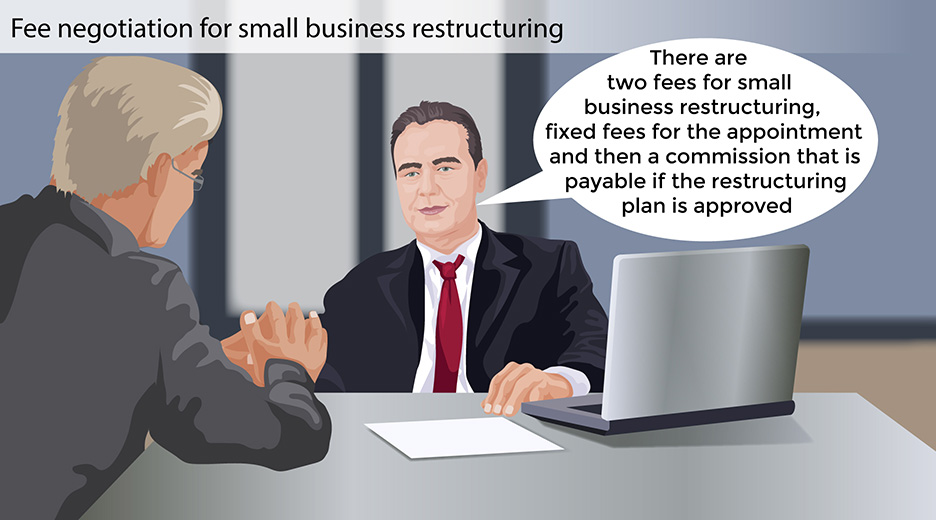Understanding the Cost of the Small Business Restructuring Process: Professional Fees
Small business restructuring is a complex process that entails two levels of professional fees. However, compared to other forms of external administration, the pricing for restructuring is more straightforward and generally lower. In this blog post, we will explore the different types of fees involved in the Small Business Restructuring Process (SBRP) and shed light on the factors that determine their amounts. Additionally, we will discuss the role of third-party professionals and the potential need for their services to support the small business restructuring process.

Fees Associated with the Small Business Restructuring Process:
1. Fixed Fees for the Restructuring Period:
During the restructuring period, a pre-agreed sum is charged to cover the services provided by the restructuring practitioner. The specific amount depends on factors such as the complexity of the business’s financial situation and the scale of the restructuring required. Negotiations regarding this fee take place between the company’s directors and the restructuring practitioner. This fee is required to be fixed in sum before the process begins and therefore the restructuring practitioner cannot charge on a fee for service basis (i.e. hourly fees for labour performed) or on a contingency basis (i.e. a fee only payable on success).
2. Commission for Plan Period:
If the creditors approve of a proposed restructuring plan, the restructuring practitioner may also receive a commission throughout the plan period. This commission is a percentage of the debts repaid to creditors under the plan. The exact percentage is determined by the restructuring plan put by the directors to the creditors as an offer. The restructuring practitioner is restricted from charging on any other basis for work undertaken during the plan period.
3. Third-Party Professional Fees:
In addition to the fees charged by the restructuring practitioner, there may be other professional fees to consider. These fees are associated with services provided by solicitors, external accountants, or bookkeepers. Since the restructuring practitioner’s fees are fixed, the responsibility of paying these third-party costs fall on the company directors.
Why are third-party professionals sometimes necessary?
While the restructuring practitioner plays a crucial role in the small business restructuring process, their responsibilities do not encompass all aspects of accounting work required by the company undergoing restructuring. For instance, they cannot simultaneously act as both the tax agent and restructuring practitioner due to inherent conflicts of interest. Moreover, as restructuring practitioners are remunerated on a fixed fee basis and are prohibited from charging additional fees, they are unlikely to provide unpaid bookkeeping and payroll services, which are likely to be essential compliance steps.
To overcome these challenges and ensure that a restructuring plan can be properly proposed to creditors, the engagement of third-party accountants may become necessary for two key reasons:
1. Lodgment of tax returns:
The lodging of tax returns is a critical aspect of the restructuring process. The key compliance step is that all tax returns must be substantially up-to-date. Third-party accountants possess the expertise and knowledge required to navigate complex tax regulations and ensure accurate and timely filing.
2. Payment of outstanding entitlements:
Payment of outstanding employment entitlements is another essential requirement of a small business restructuring. Third-party accountants play a pivotal role in the compilation and calculation of statutory and employment obligations with a high degree of accuracy. This meticulous attention to detail ensures that all financial obligations, such as employee entitlements, are met, fostering a fair and legally compliant restructuring process. If employment entitlements are not paid in full a restructuring plan cannot be proposed to creditors.
In summary, the involvement of third-party professionals, such as accountants, is likely to be essential during small business restructuring. Their expertise in tax lodgment and precise calculation of obligations helps navigate complex compliance requirements, safeguarding the success of the restructuring and ensuring that all legal and financial obligations are fulfilled with precision.
Technical Requirements for Remuneration:
The Insolvency Practice Rules (Corporations) 2016 outline the following rules regarding remuneration for restructuring practitioners:
– Rule 60-1B: Fixed fees for restructuring period:
The amount is determined through a board resolution of the company before the appointment of the restructuring practitioner. This resolution sets a specific amount as the fixed fee. There is no legislative guidance or cap regarding this fee amount.
– Rule 60-1C: Commission for restructuring period:
The commission percentage is set out in the restructuring plan presented to creditors. It represents a specified percentage of the payments made to creditors in accordance with the plan. There is no legislative guidance or limit on this commission percentage.
Insights from ASIC Report 456:
To gain further understanding of the costs involved in small business restructuring, the Australian Securities and Investments Commission (ASIC) provides valuable data. According to their report, the median remuneration for a Restructuring Practitioner is $22,055. It is worth noting that these figures should be considered in addition to third-party costs associated with the restructuring process.
| Remuneration | Count | Median |
|---|---|---|
| Restructuring practitioner | 81 | $12,940 |
| Restructuring plan practitioner | 47 | $4,735 |
| Restructuring process (includes where both the restructure and plan were completed) | 47 | $22,055 |
Conclusion:
In conclusion, the cost of the Small Business Restructuring Process in terms of professional fees can be significant. The actual amount depends on various factors, including the complexity of the business’s financial situation, the agreed-upon fees with the restructuring practitioner, and the potential requirement for additional legal or accounting services. By understanding the different fee components and their determinants, small business can better navigate the financial implications of the restructuring process.